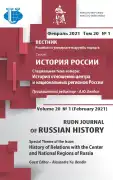The Smell of Factionalism: Left Opposition in the Vyatka Provincial Organization of the Bolshevik Party in 1923-1924
- Авторлар: Timkin Y.N.1
-
Мекемелер:
- Vyatka State University
- Шығарылым: Том 20, № 1 (2021): History of relations with the center and national regions of Russia
- Беттер: 108-124
- Бөлім: ARTICLES
- URL: https://journal-vniispk.ru/2312-8674/article/view/321842
- DOI: https://doi.org/10.22363/2312-8674-2021-20-1-108-124
- ID: 321842
Дәйексөз келтіру
Толық мәтін
Аннотация
The activity of the Vyatka left opposition that arose during the internal party discussion in the fall of 1923 and the spring of 1924 is studied. The work is based on archival documents from the Central State Archive of Kirov Region, as well as on materials from the Vyatka Pravda party newspaper. The platform of the local opposition opposed the formation of factions but insisted on clarifying what factionalism is supposed to mean. The Left Opposition united the party community of the provincial city and adjacent working areas. Most party members initially expressed full confidence in the party’s Central Committee. An analysis of archival material shows that the Vyatka opposition tried to establish a broad discussion of problems in internal party life. In the provincial center there was a party discussion club that organized heated discussions. The focus on clarifying the concepts of factions and groups reflected the desire of opposition supporters to avoid being accused of betraying the party and the cause of the revolution. Remarkably, until early January 1924 the left opposition had absolute support among party members in Vyatka. The article analyzes the Central Committee’s suppression of the local opposition in January - February 1924, and in particular the skillful techniques of Aron Solts and his supporters. At the final stage of the struggle, a group of “conciliators” arose among the members of the opposition, and contributed to the victory of the Central Committee line. The article clarifies reasons and circumstances of the defeat of the opposition, none of whose representatives openly stood in opposition to the majority of the Central Committee or called on ordinary members to protest. The authors demonstrate that the local left opposition was a situational unification of diverse forces, dissatisfied with the bureaucratization of the party, the growing dictatorship of the Central Committee, the newcomers, as well as the dominance of appointees from the Party and the Soviets. During the discussion in the organizations of the Party, the need for developing internal party democracy and a free discussion of the problems emerged, showing that there was a potential alternative to Stalinism. The main feature of the left opposition was that it formed and temporarily won the predominantly non-proletarian Vyatka, where before the 1917 revolution the zemstvo and city democratic self-government has gained roots; this is interpreted as a preservation of the demand for freedom and democracy in local society.
Негізгі сөздер
Авторлар туралы
Yuri Timkin
Vyatka State University
Хат алмасуға жауапты Автор.
Email: timkin43@mail.ru
Kandidat Istoricheskikh Nauk [Ph.D. in History], Associate Professor of the Department of Theory and History of State and Law
36, Moskovskaya St., Kirov, 610036, RussiaӘдебиет тізімі
- Bakulin, V.I. “The Party Apparatus has Broken Down and is Deteriorating”: The Development and Results of the Struggle of the Left Opposition for Intra-Party Democracy in Vyatka Province (Fall 1923 – Spring 1924).” New Historical Journal, no. 3 (2017): 96–115 (in Russian).
- Baranov A.V. “Trotskyist” opposition in the context of the consolidation of the party-state elite in the South of Russia (1923–1924).” Humanities and Legal Studies, no. 1 (2019): 34–41 (in Russian).
- Demidov, V.V. Politicheskaya bor'ba i oppozitsiya v Sibiri. 1922–1929 gg. Novosibirsk: Kadrovyy tsentr Publ., 1994 (in Russian).
- Guzarov, V.N. “The struggle of the secretary of the Tomsk provincial committee of the RCP (c) V.S. Kalashnikov against Trotskyism (1923–1924).” Tomsk State University Journal of History, no. 4 (2012): 157–160 (in Russian).
- Hincks, D. “Support for the Opposition in Moscow in the Party Discussion of 1923–1924.” Soviet Studies, no. 1 (1992): 137–152.
- Kozer, L. Funktsii sotsial'nogo konflikta. Mjscow: Ideya-Press Publ., 2000 (in Russian).
- Kruzhinov, V.M. “New Deal” L.D. Trotsky and the Bolshevik elite of the Urals.” Tyumen State University Herald. History, no. 2 (2013): 113–120 (in Russian).
- Morozova, T.I. “Political views of the communists of Siberia about the democratization of the RCP (v) – VKP (v) in the 1920s.” Power and society in Siberia in the twentieth century, no. 6 (2015): 106–132 (in Russian).
- Morozova, T.I. “Trotskyist opposition as seen by the party leadership of Siberia.” Herald of Omsk University. Series «Historical studies», no. 4 (2016): 55–62 (in Russian).
- Rogovin, V.Z. Byla li al'ternativa? ‘Trotskizm’: vzglyad cherez gody. Moscow: «Terra» Publ., 1992 (in Russian).
- Reznik, A.V. Trotskizm i Levaya oppozitsiya v RKP (b) v 1923–1924 gody. Moscow: Svobodnoye marksistskoye izdatel'stvo Publ., 2010 (in Russian)
- Reznik, A.V. “Opposition of 1923 in the RCP (v) based on materials from Perm.” Perm University Bulletin, no. 2 (2011): 109–119 (in Russian).
- Reznik, A.V. Levaya oppozitsiya v RKP (b) v 1923–1924 gg. St. Petersburg: SPbGU Publ., 2014 (in Russian).
- Reznik, A.V. “Conflict and Control: To Study the Practices of the Political Struggle of the Opposition in the RCP (V) in 1923–1924.” Perm University Bulletin, no. 1 (2014): 175–185 (in Russian).
- Robert, V. Daniels. “The Left Opposition as an Alternative to Stalinism.” Slavic Review 50, no. 2 (1991): 277–285.
- Plekhanov, A.M. VCHK–OGPU: otechestvennyye organy gosudarstvennoy bezopasnosti v period novoy ekonomicheskoy politiki. 1921–1928. Moscow: Kuchkovo pole Publ., 2006 (in Russian).
- Olekh, G.L. Povorot, kotorogo ne bylo: Bor'ba za vnutripartiynuyu demokratiyu. 1919–1924 gg. Novosibirsk: Novosibirskiy universitet Publ., 1992 (in Russian).
- Shabalin V.V. “Skloka” as a way of self-regulation of the regional elite in the 1920s.” Perm University Bulletin, no. 2 (2013): 159–166 (in Russian).
- Zinov'yev, G. Sud'by nashey partii. Moscow: Krasnaya Nov' Publ., 1924 (in Russian).
Қосымша файлдар









